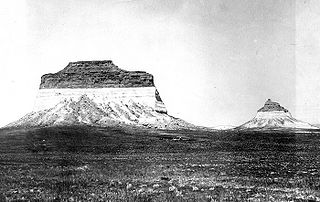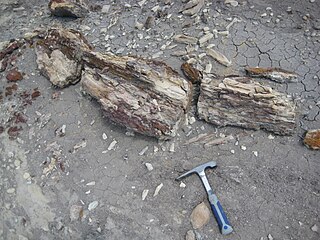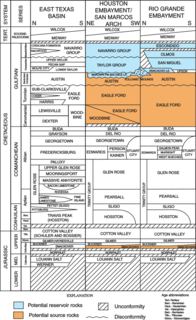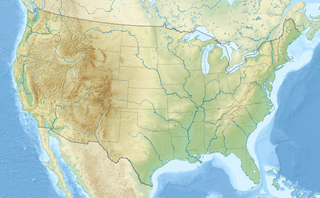 W
WAngelarctocyon is an extinct genus of Amphicyonidae, which belongs to the order Carnivora.
 W
WThe Antigua Formation is a geologic formation in Antigua and Barbuda. It preserves fossils dating back to the Late Oligocene period.
 W
WThe Arikaree Formation, also Arikaree Group or Arikaree Sandstone is a geological unit in the central High Plains of the western United States. It preserves fossils dating to the late Oligocene to early Miocene.
 W
WThe Boca de Serpiente Formation is a geologic formation in Trinidad and Tobago. The limestones stained red with hematite, preserve fossils dating back to the Priabonian period.
 W
WThe Brule Formation was deposited between 33 and 30 million years ago, roughly the Rupelian age (Oligocene). It occurs as a subunit of the White River Formation in Nebraska, Colorado, North Dakota, South Dakota, and Wyoming.
 W
WThe Central Plain Group is a geologic group in Antigua and Barbuda. It preserves fossils dating back to the Oligocene period.
 W
WThe Ceru di Cueba Formation is a geologic formation in Curaçao. It preserves fossils dating back to the Bartonian period.
 W
WThe Ceru Mainsjie Formation is a geologic formation in Curaçao. It preserves fossils dating back to the Bartonian period.
 W
WThe Chickaloon Formation is a geologic formation in Alaska. It preserves fossils dating back to the Paleogene period.
 W
WThe Crystal River Formation is a geologic formation in Florida. It preserves fossils dating back to the Paleogene period.
 W
WThe DeBeque Formation is a geologic formation in Colorado's Piceance Basin, preserving fossils which date back to the Late Paleocene to Early Eocene period (Clarkforkian to Wasatchian in the NALMA classification. Examples of these fossils are held in the University of Colorado Museum of Natural History.
 W
WThe Eureka Sound Formation is a geologic formation found in the Canadian Territory of Nunavut on Ellesmere Island, which is part of the Canadian Arctic Archipelago. The Eureka Sound Formation is Tertiary in age.
 W
WThe Gering Formation is a geologic group in Nebraska. It preserves fossils dating back to the Paleogene period.
 W
WThe Hanna Formation is a geologic formation in Wyoming. It preserves fossils dating back to the Torrejonian to Tiffanian stages of the Paleogene period.
 W
WThe Huerfano Formation is a geologic formation in Colorado. It preserves fossils dating back to the Paleogene period.
 W
WThe Jabaco Formation is a geologic formation in Cuba. It preserves fossils dating back to the Paleogene period.
 W
WThe Jebel Qatrani Formation is a palaeontological and geologic formation located in the Faiyum Governorate of central Egypt.
 W
WThe Laredo Formation is a geologic formation and Lagerstätte in Texas, United States and Nuevo León and Tamaulipas, Mexico. It preserves fossils dating back to the Lutetian stage of the Eocene period. Among many other fossils, the formation has provided invertebrates, vertebrates, leaves, pollen and spores and fossil wood of the brackish water palm Nypa sp.
 W
WThe Lizard Springs Formation is a geologic formation in Trinidad and Tobago. It preserves fossils dating back to the Paleocene to Early Eocene period.
 W
WThe Llajas Formation is a non-marine to marine conglomerate geologic formation in Southern California.
 W
WThe Loma Candela Formation is a geologic formation in Cuba. It preserves fossils dating back to the Paleogene period.
 W
WThe Menat Formation is a geologic formation in France. It preserves fossils dating back to the Paleocene. It is a maar deposit located on top of an ancient volcano, the extent is very localisted with the outcropping area being around 600 by 1000 metres. Numerous species of fossil insects, plants and fish are known, as well as some isolated mammals.
 W
WThe Messel Formation is a geologic formation in Hesse, central Germany, dating back to the Eocene epoch. Its geographic range is restricted to the Messel pit. There it unconformably overlies crystalline Variscan basement and its Permian cover (Rotliegend) as well as Eocene volcanic breccias derived from the basement rocks. The formation mainly comprises lacustrine laminated bituminous shale renowned for its content of fossils in exceptional preservation, particularly plants, arthropods and vertebrates.
 W
WThe Midway Formation is a geologic formation in Texas. It preserves fossils dating back to the Paleogene period.
 W
WThe Monteils Formation is a geologic formation in France. It preserves fossils dating back to the Paleogene period.
 W
WThe Morne Diablo Limestone is a geologic formation in Morne Diablo, Trinidad and Tobago. It preserves fossils dating back to the Oligocene period. The formation is laterally equivalent to the Cipero Marl and San Fernando Formation.
 W
WThe Nariva Formation is a geologic formation in Trinidad and Tobago. It preserves fossils dating back to the Paleogene period.
 W
WThe Niveau du gypse d'Aix Formation is a geologic formation in France. It preserves fossils dating back to the Paleogene period.
 W
WThe Poul Creek Formation is a geologic formation in Alaska. It preserves fossils dating back to the Paleogene period.
 W
WThe Puget Group is a geologic group in Washington (state). It preserves fossils dating back to the Paleogene period.
 W
WThe Renton Formation is a geologic formation in Washington (state) within the Puget Group. It preserves fossils dating back to the Paleogene period.
 W
WThe San Francisquito Formation is a geologic formation in northern Los Angeles County, California.
 W
WThe Saramaguacán Formation is a geologic formation in Cuba. It preserves mainly plant fossils, dating back to the Middle Eocene period.
 W
WThe Scotland Beds is a geologic formation in Barbados. It preserves fossils of Falconoplax bicarinella and Palaeopinnixa perornata, dating back to the Early Eocene period.
 W
WThe Soldado Formation is a geologic formation in Trinidad and Tobago. It preserves fossils dating back to the Thanetian to Bartonian period.
 W
WThe Solent Group is a geological group in the Hampshire Basin of southern England. It preserves fossils ranging in age from Priabonian to Rupelian. The group is subdivided into three formations, the Headon Hill Formation, the Bembridge Limestone Formation and the Bouldnor Formation.
 W
WThe Woolwich Formation is a geological formation in southeast England. It preserves fossils dating back to the Paleogene period.